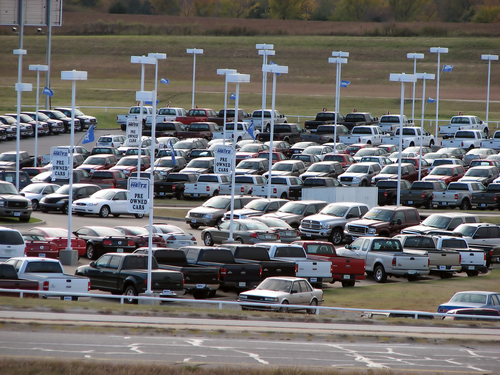In today's world, change is inevitable, especially as technologyquickly changes how we live and work. So, it's not surprising thatan auto insurance market research analyst is predicting the end ofthe auto insurance business as we currently know it.
|That's right. No more auto insurance.
|Why? According to Deutsche Bank research analyst JoshuaShanker, in 20 years, instead of people owning and driving cars,it's possible that self-driving and ride-sharing companies make upthe majority of the automotive market. As such, the companiesbehind these services will be able to insure their cars like anyother product, not based on the driving habits of millions ofdifferent drivers.
|[Related: Progressive profit gains 24% after adding homeinsurance coverage]
|In a July 19 research note about auto insurer Progressive,Shanker wrote that self-driving cars and ridesharing are"disruptive technologies" that will likely influence how autoinsurance is sold. He went on to predict an "accident-free" futurewhere it becomes difficult to charge for premiums or differentiateamong drivers.
|Beginning of a state of disruption for the autoinsurance industry
|The analyst downgraded Progressive, citing underlyingfundamentals for the company, but also predicted that newtechnology will make Progressive's primary auto insurance businesspassé. The market research note acknowledged that Progressivemay find its way to dominating a new kind of auto insurance world,but noted that the insurer also may find its products completelyunnecessary by 2030.
|"Over the long term, we believe technological change in drivingbehaviors represents a massive threat to the personal autoinsurance market," wrote Shanker. "The concurrent rise ofinstant ridesharing and autonomous vehicles presents real questionsas to whether there will even be an auto insurance industry as weknow it in 20 years, what percentage of cars on the road will beessentially accident-free in 10 years and whether to acknowledge injust 5 years that this isn't some 'George Jetson' fantasy."
||
3 key changes coming
|Three probable outcomes arising from the current trends in autoinsurance were listed in the analyst's note as key to theirconclusions:
|1. Accident frequency will decline towhere the difference among driving behaviors becomes negligible andit is difficult to charge a meaningful premium for insurance.
|2. Insurance will take the form ofcommercial product liability instead of personal driverliability as we let the robots do the driving.
|3. Vehicle utilization will rise and carson the road will decline as one car can serve the drivingneeds of multiple travelers per day, which, in-turn, means fewercars.
||
A new kind of auto insurance market
|Of course, the auto industry has always had to adapt to changes.In fact, based on new vehicle technology and other improvements,the number of auto accidents have been declining for some time.
|Bob Passmore, Assistant Vice President of PersonalLines, for the Property Casualty InsurersAssociation of America (PCI), says: "The auto insuranceindustry is constantly looking to adapt to the needs of theindustry and consumers. While it remains to be seen how claims willshake out with the new disruptive technologies, vehicle insurancewill still be needed for a very long time. In the future, forexample, the risk and premiums could be less about the driver oroccupants and more about the software or particular vehicle."
|[Related: P&C insurance: More adaptable than we give itcredit]
|While arguing that the concerns regarding auto insurance arewell-known to the industry, the analyst concluded that it's apossibility that Progressive could dominate a new kind of autoinsurance market, but indicated it's more likely new entrants inthe market "may grasp the winds of change faster than theincumbents."
Want to continue reading?
Become a Free PropertyCasualty360 Digital Reader
Your access to unlimited PropertyCasualty360 content isn’t changing.
Once you are an ALM digital member, you’ll receive:
- All PropertyCasualty360.com news coverage, best practices, and in-depth analysis.
- Educational webcasts, resources from industry leaders, and informative newsletters.
- Other award-winning websites including BenefitsPRO.com and ThinkAdvisor.com.
Already have an account? Sign In
© 2024 ALM Global, LLC, All Rights Reserved. Request academic re-use from www.copyright.com. All other uses, submit a request to [email protected]. For more information visit Asset & Logo Licensing.








